The Good Doctor’s Freddie Highmore, EPs on the Significance of [Spoiler]’s Death and Series Finale Time Jump
The Good Doctor gets a final assist from his very good father in the ABC medical drama’s touching sendoff.
In Tuesday’s series finale, Dr. Shaun Murphy struggles, but ultimately accepts, that Dr. Aaron Glassman will die of terminal brain cancer. He promises Glassman that he will be there for him in his final days, and accompanies him on one last ride aboard the carousel he used to ride with his late daughter Maddie.
More from TVLine
Grey's Anatomy Recap: [Spoiler] Is Fired - and as One Couple Breaks Up, Another One Hits the Sheets
Elsbeth's Carrie Preston Talks 'Vulnerable' Season Finale, Pitches Role for Husband Michael Emerson
Glassman, in turn, saves Shaun from losing his medical license. He proceeds with a non-FDA approved treatment on Claire, who loses her left arm but manages to survive a gnarly post-op infection that nearly takes her life.
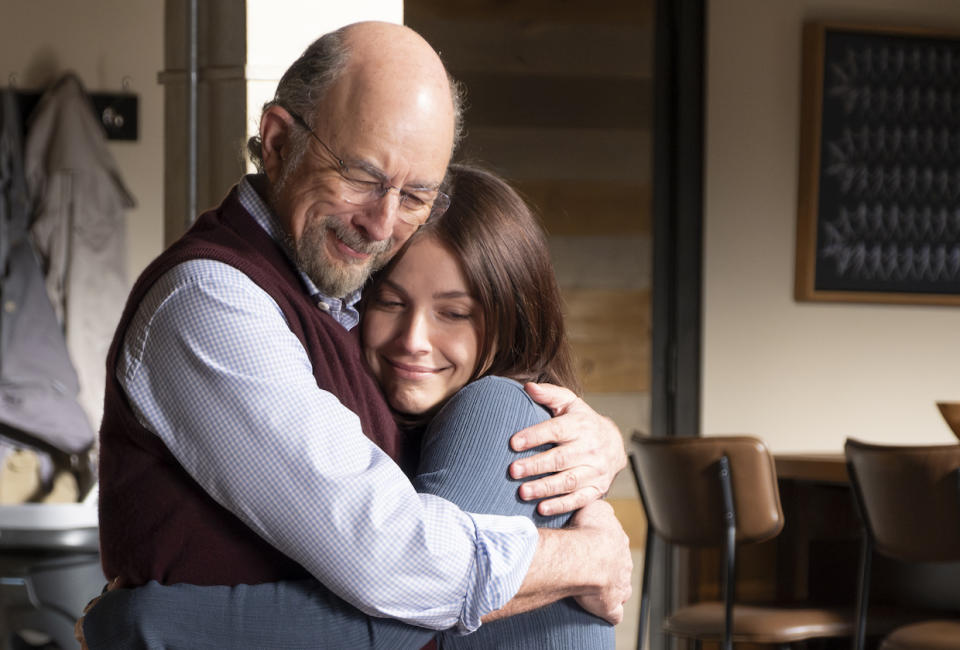
In its final minutes, The Good Doctor jumps ahead several years. Shaun, who is now chief of surgery at San Jose St. Bonaventure Hospital, gives a TED Talk about his phenomenal journey and the man who made it all possible. Six months after Glassman died, Shaun started the Dr. Aaron Glassman Foundation for Neurodiversity in Medicine, which he runs with Claire. In a few years’ time, the foundation already has affiliations with 17 hospitals and 32 medical schools.
As Dr. Murphy gives his TED Talk, we see that all of his friends and loved ones are there to support him. That includes his wife Lea, their son Steve… and a daughter, who was born after Glassman died. Also in attendance are Drs. Alex Park and Morgan Reznick, who have officially adopted Eden; Drs. Browne and Jared Kalu, who also have a daughter now; Drs. Jordan Allen and Danny Perez, who are married; Dr. Audrey Lim, who left St. Bons and enlisted in Surgeons for a Better World; Nurse Jerome Martel, who is seen holding hands with a new partner, years after the unexpected loss of Dr. Asher Wolke; former med student Charlotte “Charlie” Lukaitis, who is now teaching her own crop of interns at St. Bons; fellow former med student Dominick “Dom” Hubank, who has left St. Bons and opened a community health center; and Nurses Villanueva and Hawks.
“I wanted to help people, and save lives, and I wanted to make a lot of money so I could buy a television,” Dr. Murphy says as his lecture draws to a close. “But because of Dr. Glassman, I have much more than that: I have many friends, I have a family… and I have two televisions.”
Shaun and Lea, and their son and daughter, walk out of St. Bons hand in hand, and the episode cuts to black. That’s a wrap on The Good Doctor.
Below, series star/executive producer Freddie Highmore, and co-showrunners/fellow EPs David Shore and Liz Friedman, talk with TVLine about bringing the long-running medical drama to an end.
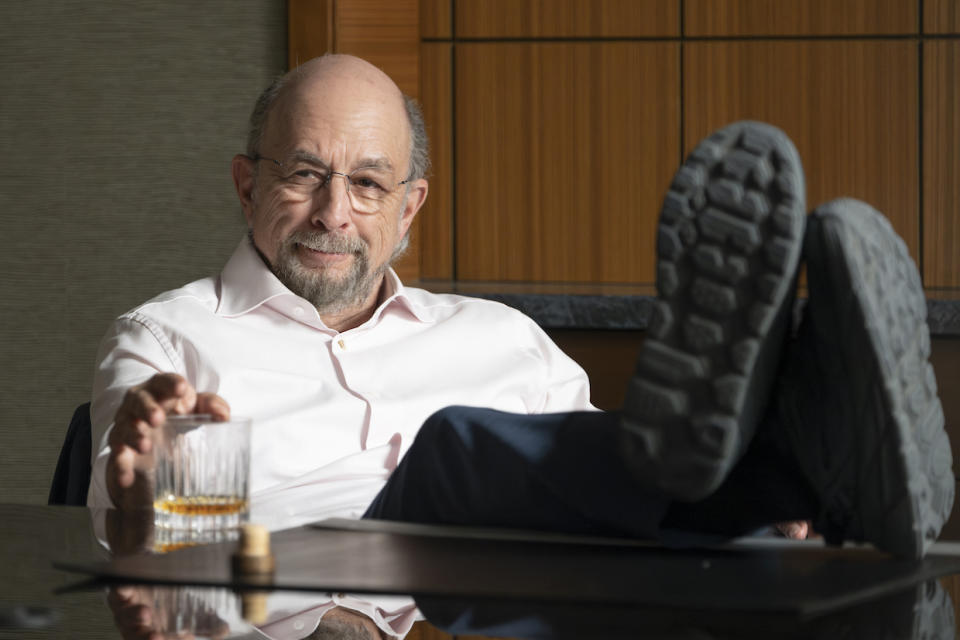
TVLINE | David, the finale marks the death of Dr. Aaron Glassman, whose mortality is something we’ve discussed on and off for six years now. Did you always have a sense that Glassman’s passing would tie into the end of the show?
SHORE | No. I wish I was that brilliant! Liz has talked about this a fair bit, and it makes so much sense. It’s Chekhov’s cancer: If you introduce it in Season 1, you need to pay it off in Season 7.
FRIEDMAN | Shaun faces a really unique challenge because of his ASD: He’s a doctor, and his mentor has this very serious illness. He wants to deal with it as medicine, and Glassman doesn’t want to do that; he simply wants to have a personal relationship. For Shaun, that is as hard [to accept] as it would be for me to figure out how to treat Glassman’s cancer…. He has had this very close, and very vulnerable, relationship with Glassman, and that’s been key to his development. It’s such a natural question to ask, “How will he handle life without him?”
TVLINE | It sounds like the goal here was not about teaching Shaun that even the best doctors can’t save everyone. It was more about getting him to a point where he recognizes that being there emotionally for those he loves is sometimes more important than the medicine.
FRIEDMAN | I think that’s right. Shaun has dealt with losing patients before. He does understand that there are illnesses and conditions that can’t be beat. But what if this person doesn’t want to [turn] to medicine?
HIGHMORE | Shaun has always prioritized the medicine; that has always been his goal. That is what he needed to overcome the challenges that he has faced. For him to realize that he has gotten to a point in life where he is now surrounded by people who love him, who are there to support him, and who he cares so deeply about, it changes the way he sees his priorities in life. It shows just how far Shaun has come, and what it means to have unconditional love and share that with people.
TVLINE | Glassman helped get Hannah into rehab, and he’s seen Shaun grow as a surgeon, as a husband, and as a father. Do you think he was, in some sense, at peace with the cards life dealt him in the end?
FRIEDMAN | I think so, especially because Shaun — with Leah’s help, and with the help of the people around him — was able to step up and do the right thing by his friend, which is accepting that he didn’t want to fight his cancer and that he wanted to enjoy the time he had left. Shaun being able to empathize, and being willing to allow Glassman’s emotional point of view to take lead, I think that really shows Glassman that his work here is done.
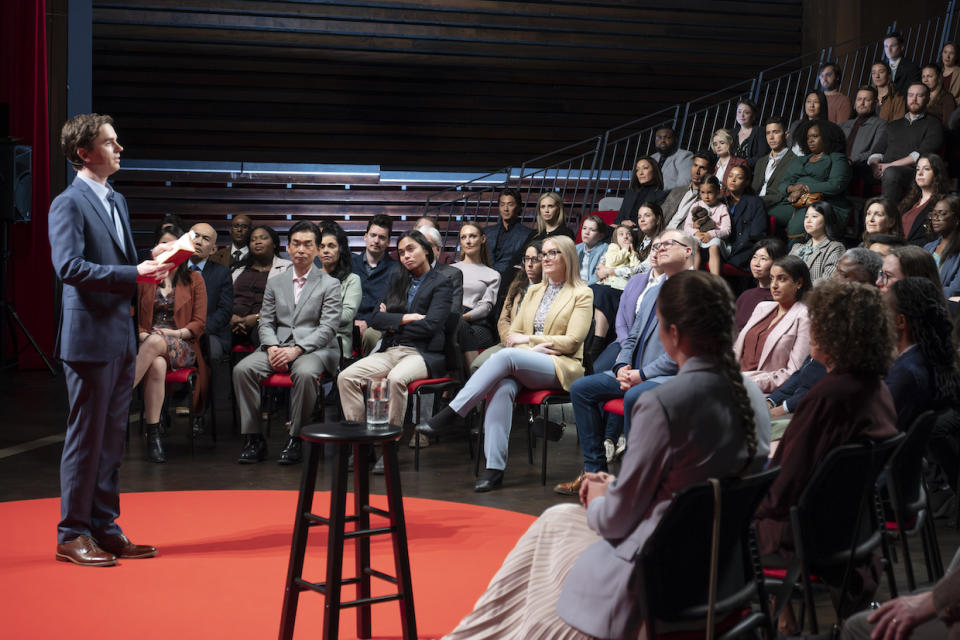
TVLINE | Although he doesn’t have to go through it, we see that Shaun is willing to risk his medical license to save Claire. Is that a decision you think he would have been capable of making seven years ago?
HIGHMORE | No, absolutely not. I think a large part of that is Dr. Glassman, and Lea as well, and all of the characters who have been there for Shaun throughout this journey. But no, I don’t think he would have been able to process that, and to come to terms with that. He has matured so much, and to get to the point where he’s able to [make that decision] is massive.
SHORE | There’s been real growth in this character over these seven years. That, to a great extent, is what this episode is about.
TVLINE | Was it always the plan that Shaun would start the show as a surgical resident and end the show as chief of surgery?
SHORE | No. When you start a show, you think you’re doing 12 episodes. That would’ve been a little rushed. We always wanted him to face challenges, and struggle, and ultimately succeed. The idea that he’s chief of surgery was a specific [idea] that we hadn’t really thought of until the end.
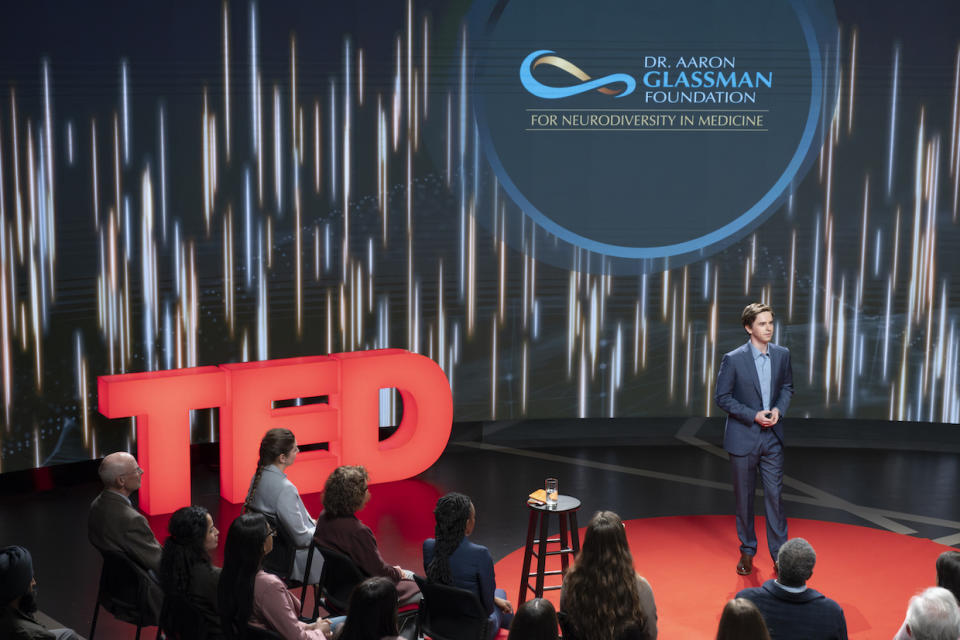
TVLINE | Freddie, what was it like getting to reflect on the culmination of this journey through Shaun’s eyes, as he delivered his TED Talk?
HIGHMORE | It was very special, and certainly put into perspective just how far he had come. In terms of speeches, though, funnily enough, the speech that felt almost more meaningful to film was in the previous act — the one where he’s in the boardroom — because we returned to the very same space where we filmed Shaun’s speech to the board in the pilot episode. We had never been back to that location, and David really wanted to [revisit that]. There was something surreal, and also lovely, about standing up there, in the very same spot seven years later, and to give a very different kind of speech as Shaun is coming to terms with the fact that Dr. Glassman won’t be with him for much longer. That felt really beautiful as a landing point.
SHORE | He started his journey in that room, and he is [back] there to think about whether he is willing to end his journey [to save Claire], and whether the price is worth it. So much happened [in that boardroom] that changed his life there. We wanted to bring that room back, and all that it meant to him, and to bookend the series with that.
HIGHMORE | Of course, the TED Talk was also very special, surrounded by crew who we snuck in there as a few of the audience members, and also everyone in the cast who has been a key part of this entire journey. It was very meaningful, all of us there together, one last time.
TVLINE | Which was more difficult to write: Shaun’s boardroom monologue or his TED Talk?
SHORE | They’re both incredibly important, but one is the final message of the show. We struggled with that a little bit, and went back and forth. How far do we want to go? How much do we want Shaun to say, “Look at what I’ve done”? How meta can you let that be? That was the TED Talk, and that was the message we want to leave our audience with, so to some extent that was easy, but how you execute it was difficult.
The boardroom [monologue] was more challenging for more mundane reasons, which is that there was actually a lot of story to cover in that. He had to tell Glassman that he has accepted his death… he has to say that he is willing to give up his career for Claire, and Glassman has to stop him… and we needed to have the callback [to the pilot] and how far he’s come. There was a trickiness there, but boy was it fun going back to that. We’re very pleased with how it came out.
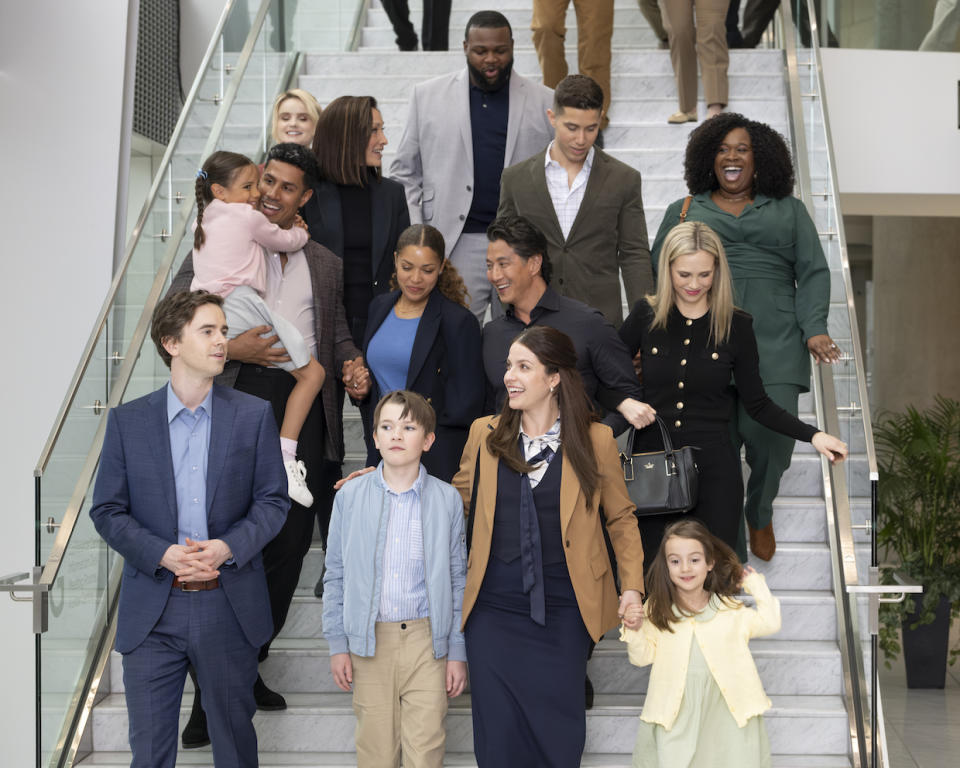
TVLINE | Claire has been through quite a lot these past seven years. She lost her mother, then she lost Melendez, and now she’s lost her freakin’ arm! In the future, we see that she’s with Jared, they have a daughter, and she’s running the foundation with Shaun. Was it important, especially in Claire’s case, that her happy ending involve some sense of stability?
FRIEDMAN | Oh, that’s really interesting. I had never thought of it that way, but I think you’re absolutely right. She is willing to accept love from Jared, which she wasn’t before… she has demonstrated that she can be strong and let her strength lead through the work she has done in [Guatemala]… and she is doing something [now, running the Glassman Foundation], that is very important and meaningful to her.
TVLINE | In the end, we see that nearly everyone is coupled up… except for Lim. She contemplated joining Clay in Chicago, but ultimately joined Surgeons for a Better World. Why did that feel like the right outcome for her?
SHORE | We wanted to show our people moving forward, and moving forward with positivity, but we didn’t want it to just be about, “Oh, they’re all happily married.” A lot of them have someone in their lives, and Lim may have somebody in her life, but that wasn’t the defining point at this moment in her life. I think it was important to Lim that her life not be defined by who she is with, and more have it be defined by what she has done.
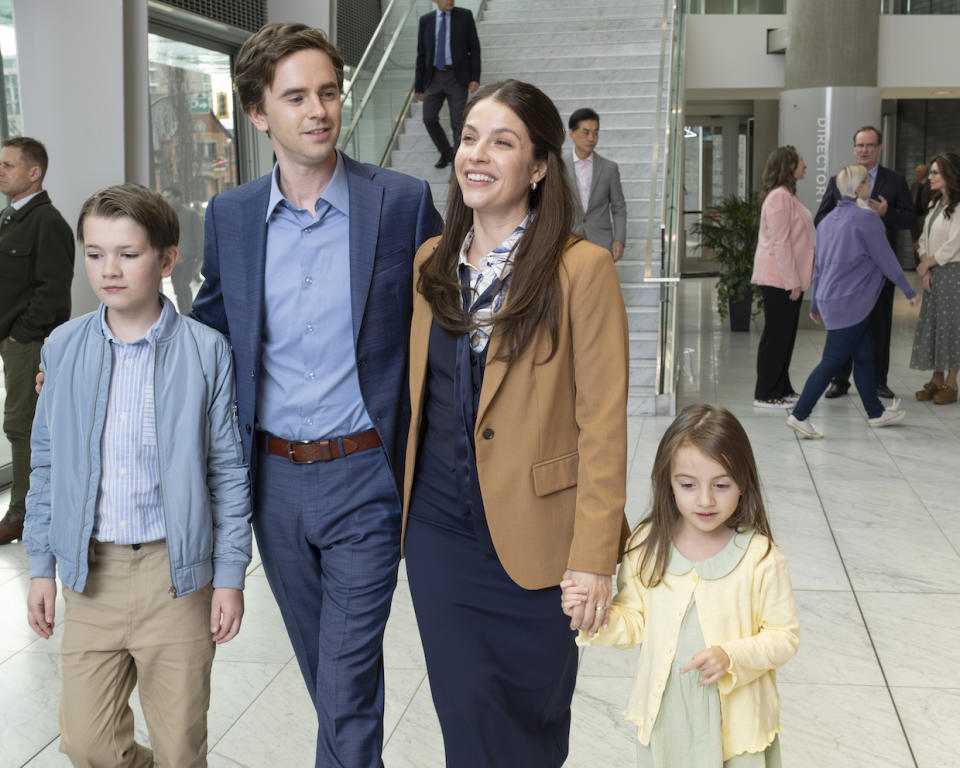
TVLINE | We always knew that Shaun would achieve great things in medicine. But we didn’t necessarily know how much he would achieve in his personal life, and in his relationship with Lea. Would you say that having a family of his own was ultimately his greatest accomplishment of all?
HIGHMORE | Yes, I think so. I also think that it has made Shaun a better doctor. He has always been a brilliant surgeon. Medically, he has always had this ability to see things that other people can’t. He thinks differently and comes up with incredible solutions to cases that other people would never be able to see. But I think that came not from an inability for Shaun, but simply a lack of opportunity. To see him navigate the early days of his relationship with Lea, to getting married, to Shaun and Lea having a baby, I don’t think those are things that necessarily were something that Shaun dreamed about at the very beginning of the show. Getting him to that point does seem huge.
TVLINE | Shaun and Lea have another child, a daughter, but we don’t learn her name…
FRIEDMAN | It’s Maddie.
SHORE | It’s never mentioned. It’s in the script that it’s Maddie, but it’s never said out loud. Freddie and I were joking about that because Freddie was going, doesn’t Leah get to name any of the children? [Laughs]
FRIEDMAN | Leah hasn’t had quite as much trauma as Shaun, so she defaults on getting to name the children.
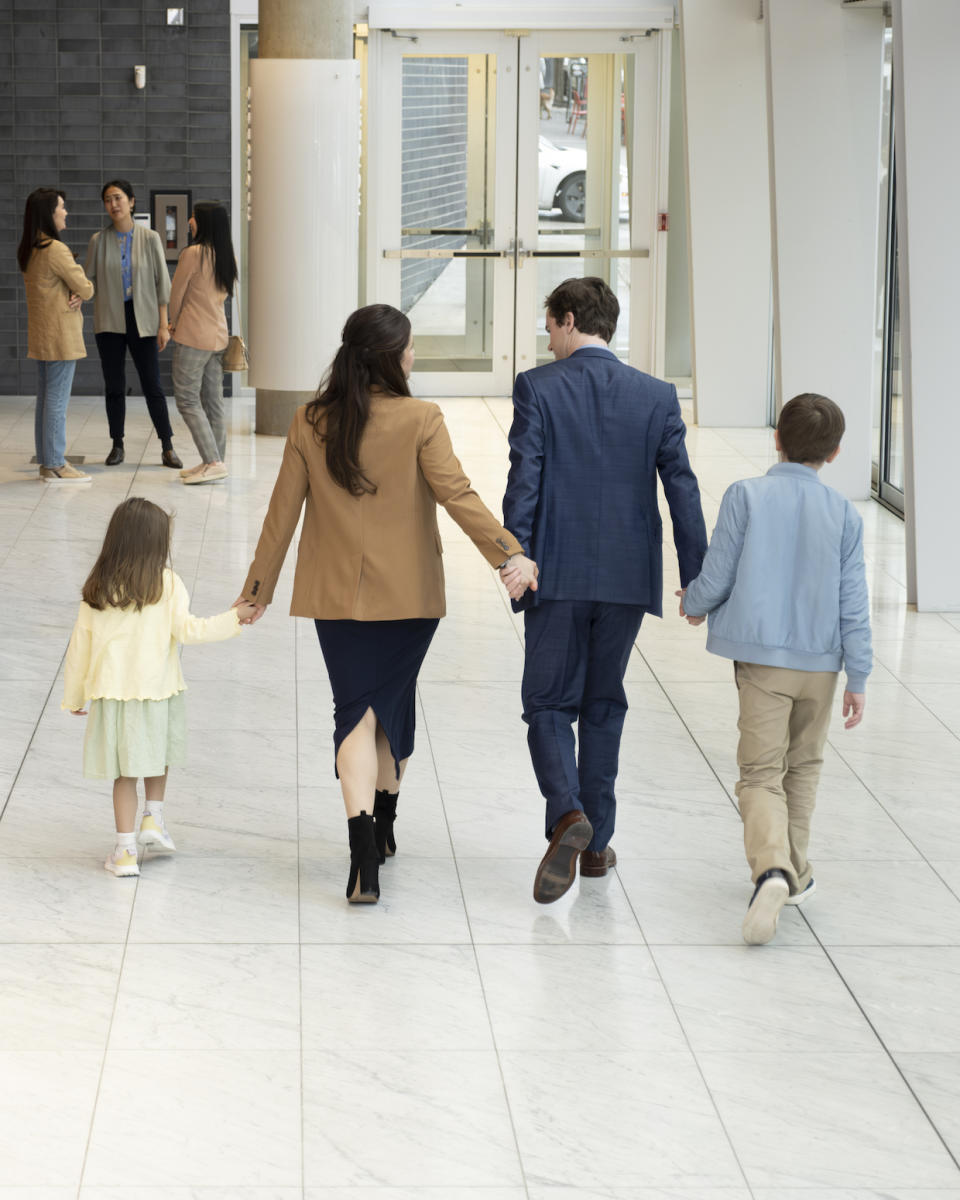
TVLINE | What has Dr. Murphy taught you? Is there a lesson that you will take with you moving forward?
HIGHMORE | I feel like where Shaun and I have probably always been aligned, just in slightly different ways, is how Shaun cares so much about the medicine, and doing everything he can to save patients. An I feel like, collectively, on The Good Doctor, one of the things that has made it so special is that everyone on it has had that same attitude of wanting every scene to be as good as it can possibly be, and making the most of the opportunities that have come our way and being grateful for them. The way that Shaun has always seen his job is the way that we have seen our jobs on this show.
Shaun has come to terms with Dr. Glassman [dying]. He has moved on, he is happy. He has his family, and he will be OK. I think that, for all of us on this show, the same is also true. There is a peacefulness in knowing that you have given everything and have done your very best, and I know that all of us feel that, and we are grateful for this opportunity. We also will be OK as we move to whatever is next.
TVLINE | Typically, I’d ask if you see yourselves revisiting this character years down the line, but we end with Shaun telling us that he owns two televisions now. I can’t imagine topping that ending in a hypothetical revival or TV-movie.
SHORE | [Laughs] We spoiled that opportunity! We could have done a whole movie about that.
FRIEDMAN | The Good Doctor: Quest for the Second Television.
SHORE | That is the ultimate message of the series: TV is very, very important.
What did you think of The Good Doctor’s series finale? Grade it via the following poll, then leave your review in Comments.
Best of TVLine
Get more from TVLine.com: Follow us on Twitter, Facebook, Newsletter
